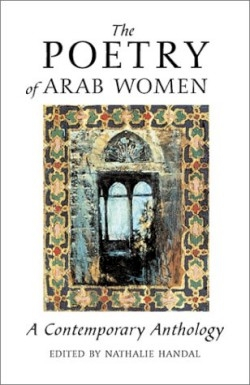The Poetry of Arab Women
Handal assembles a catalog of the anomie of displacement that links the eighty-three poets selected for this collection. Her lengthy introduction, both factually impressive and emotionally heartwarming, awakens an excited interest for the poetry that follows. A haunting and pervasive commitment unites these poets from Arab groups in the Middle East, the Levant, North Africa, and onward to emigrees in France, America, Canada, and other areas. The poetic gift of every woman in the collection is, as always, unique and individual. The lacerating search for “self,” however, is an underlying theme in the experience of each of them, whether as an exotic and suspected stranger in an unfamiliar world, or as a non-person in the literary census of her own country simply because of the accident of gender.
A number of the poets, especially Arab Americans, write in English, but those needing translation have been blessed with carefully selected artists. The English versions have a grace and an integrity seldom found in translations. Both poets and translators are indexed alphabetically, with enough biographical information about each for an effective introduction. Most are university-educated; all are published poets.
Since these poets share neither citizenship, geographical location, or a common religion, what is it, one might ask, that makes them all “Arabs”? Even for those living outside the Arab nations, there is a certain atavism in the persistence of cultural folkways that extend for generations beyond their country or society of origin. This background, even if vague and dim, is the ground out of which an individual essays her first and continuing struggle for identity. No matter how long ago, or how far away the poet has traveled, there remains a persistent nostalgia for the lost or abandoned homeland. From Elmaz Abi-Nader, a Lebanese poet educated and residing in the United States: “I look into this mirror and see / a thousand mirrors behind me. / My mother’s face, between bright curtains / watches the damp garden.”
From Jordanian Zulaykha Abu-Risha, translated by Clarissa Burt: “O Little Brother / Come, let’s dream together of journeying far / Come, let’s not go back / when the homeland expels us / and there remains nothing but our tree / alone / in the swamp.”
At bottom what links all these poets is that they are, like a mother, a sister, a daughter, or—for an assumed fifty percent of readers—simply women, united by a common ethnic or cultural background, and exploring those areas of permanent concern to all women; love of family, the search for beauty and meaning, the need for courage in the face of injustice and a new and growing valor that insists on being included in the arena of public affairs.
Reviewed by
Sandy McKinney
Disclosure: This article is not an endorsement, but a review. The publisher of this book provided free copies of the book to have their book reviewed by a professional reviewer. No fee was paid by the publisher for this review. Foreword Reviews only recommends books that we love. Foreword Magazine, Inc. is disclosing this in accordance with the Federal Trade Commission’s 16 CFR, Part 255.

